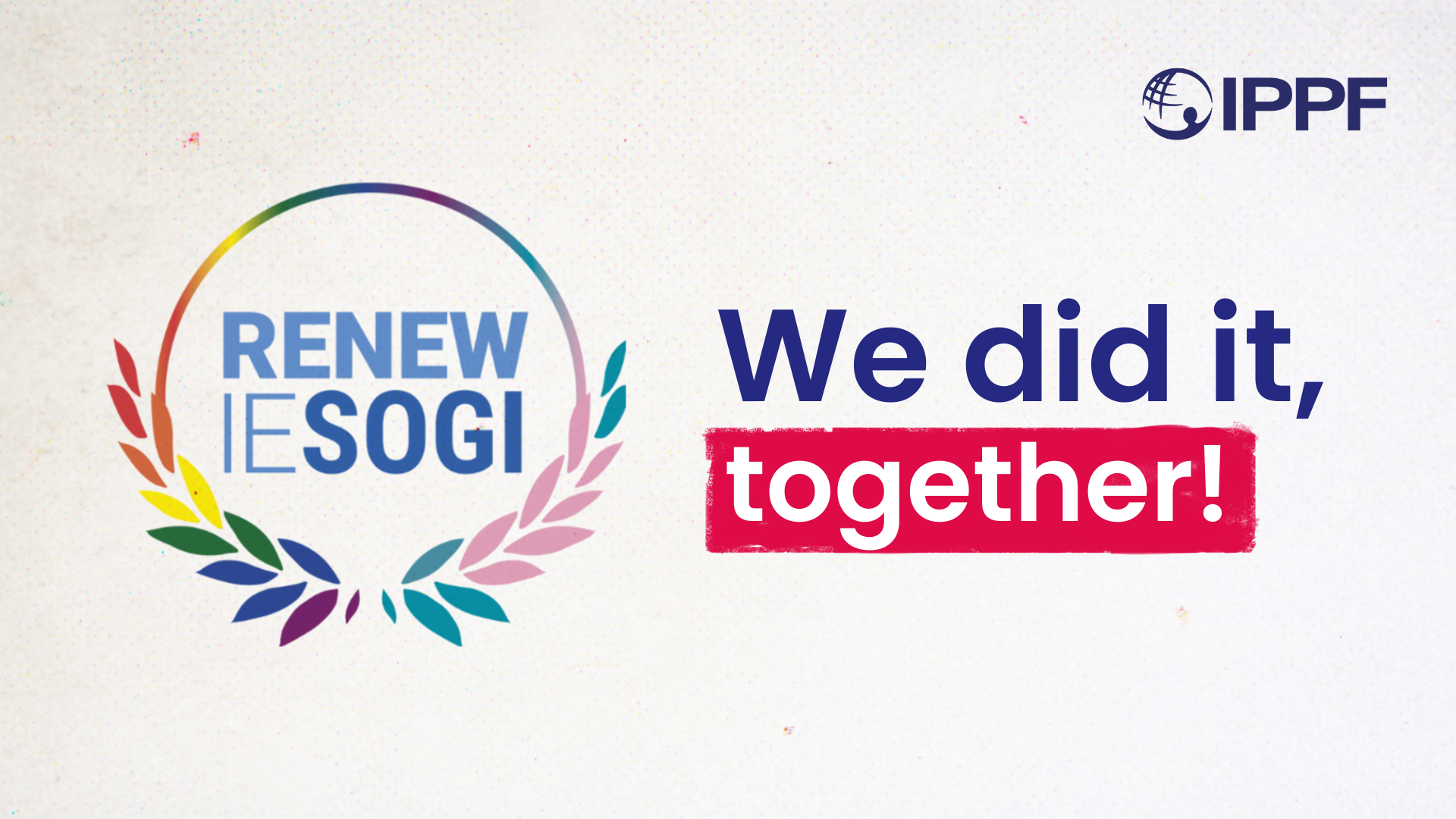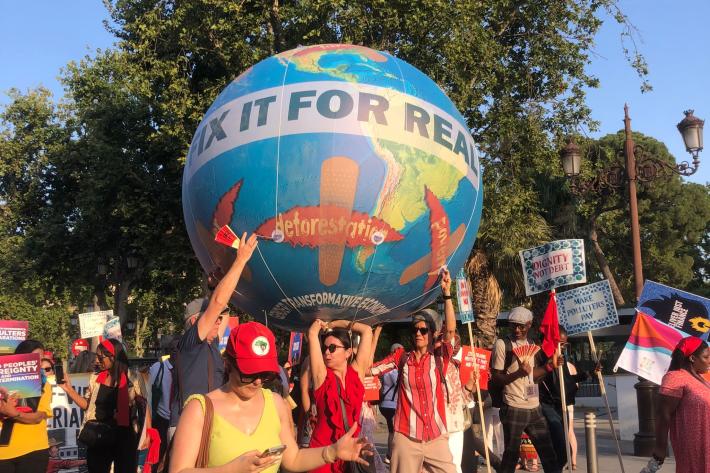Latest press releases
A selection of stories from across the Federation

Nearly 9 Million Denied Essential Reproductive Healthcare as Trump-Era Funding Cuts Force Global Clinic Closures, IPPF Reports
FOR IMMEDIATE RELEASE
For media enquiries
Telephone:
+44 7918 845944Email IPPF:
Email: media@ippf.org

| 07 July 2025
UN renews crucial human rights expert mandate on sexual orientation and gender identity
(Geneva, 7 July 2025) - The Human Rights Council has renewed the mandate of the only human rights expert within the United Nations system that is specifically dedicated to addressing violence and discrimination against lesbian, gay, bisexual, trans (LGBT) and gender diverse persons.Following a campaign by 1,259 non-governmental organisations from 157 States and territories, the UN human rights body adopted the resolution by a vote of 29 in favour, with 15 voting against and 3 abstaining. Thanks to this vote, the Human Rights Council reaffirmed its commitment to combating discrimination and violence against everyone, reminding all States of their obligations towards people of diverse sexual orientations and gender identities.The Independent Expert on protection against violence and discrimination on the basis of sexual orientation and gender identity (SOGI) will now be able to continue the work for three more years. The mandate is currently held by South African scholar Graeme Reid."IPPF warmly welcome the renewal of the UN Independent Expert on SOGI. This role is vital at a time when LGBTQI+ communities around the world are facing growing attacks on their rights and freedoms. As one of the world’s largest providers of sexual and reproductive health services to marginalized communities, we know that bodily autonomy and access to care cannot be taken for granted. We look forward to continuing the work alongside the Independent Expert to ensure that LGBTQI+ people everywhere can live with dignity, make informed choices about their bodies, and access the care they need without fear, violence or discrimination." - Micah Grzywnowicz, Regional Director of IPPF European NetworkCreated in 2016, and renewed in 2019 and 2022, the mandate of the Independent Expert on SOGI has been supported by a growing number of States from all regions. The current resolution to renew the mandate was presented by a Core Group of six Latin American countries – Brazil, Chile, Colombia, Costa Rica, Mexico, and Uruguay - and was co-sponsored by 50 countries from all regions. The Independent Expert is tasked with assessing the implementation of international human rights law, investigating violence and discrimination against LGBT and gender diverse persons, and helping States, UN agencies, other mandates and bodies in the international and regional systems to address them. Since the post was established, three successive mandate holders have conducted official visits to 11 countries, produced 17 reports documenting discrimination on the grounds of sexual orientation and gender identity - including the impact of the criminalisation of same-sex relations between consenting adults, the need to legally recognise a person’s gender, and the situation of LGBT persons who are forcibly displaced, among others - and sent communications documenting allegations of human rights violations to 171 States across all regions.Having secured a renewal for three more years, this mandate will now continue to support initiatives ensuring that LGBT and gender diverse people can live free of discrimination in countries around the world, and to amplify their voices and testimonies in international human rights fora. Civil society worldwide urges all governments to cooperate fully with the Independent Expert in this important work to bring about a world free from violence and discrimination for everyone.

| 09 March 2022
Statement on the Guatemalan law on 'Protection of the Life and the Family'
On International Women's Day 2022, Guatemala's Congress passed a law which triples the prison sentences for women seeking abortion care, prohibits same-sex marriage and further bans the teaching of comprehensive sexuality education and sexual diversity in schools, saying that teaching "anything other than heterosexuality is normal" is against the law. The "Life and Family Protection Law" was passed by an overwhelming majority of 160 - 8 in the conservative-led Congress, but still needs to be signed by Guatemala's president, Alejandro Giammattei, in order to come into force. Under the new law, women who "have induced their own abortion or given their consent to another person to carry it out" will face a minimum of five years in jail, but the sentences could reach a maximum of 25 years. Abortion is illegal in Guatemala except in cases where the woman's life is at risk. This law is the latest of a series of laws to attack human rights across the country, including gender equality and sexual and reproductive health and rights. The initiative goes against human rights agreements, especially for women and LGBTI+ people and condemns and denies the diversity of families including mono-parental homes. Eugenia Lopez Uribe, IPPF's Regional Director for Americas and the Caribbean Region, said: "It is disturbing that on International Women's Day 2022, the Guatemalan Congress passed a law that completely violates the human, sexual and reproductive rights of women, girls and marginalized people. "While countries across Latin America were celebrating the lives and rights of women, Guatemala has chosen to criminalize those making the best decision for themselves and their families, while also risking imprisoning vulnerable women and girls who have experienced sexual violence or suffered pregnancy loss. By severely limiting access to safe and post-abortion care, the law will undoubtedly lead to an increase in unsafe abortions and a decrease in prenatal care, resulting in life-long disabilities for some women and a rise in maternal deaths. "At the same time, by prohibiting same-sex marriage, limiting comprehensive sexuality education and enabling the discrimination of sexual diversity, the Guatemalan government is creating a society that fosters miseducation, stigma, intolerance and homophobia and fuelling the persecution of LGBTI and non-binary people. "IPPF strongly condemns the passing of this archaic law and demands that the Guatemalan government fulfils international human rights agreements. We stand in solidarity with affected people across Guatemala and the organizations working tirelessly to ensure that all people have the freedom to make their own choices." For media enquiries, please contact Karmen Ivey on kivey@ippf.org or media@ippf.org
















